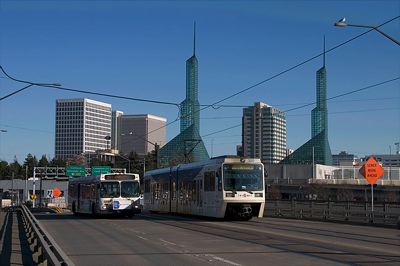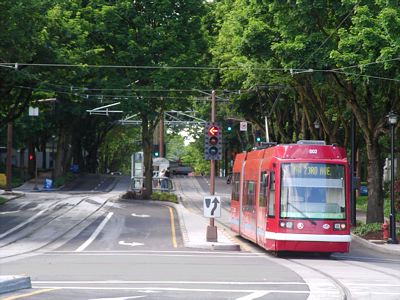Portland’s transit agency, TriMet, “knows the key to increasing ridership is offering more frequent bus service.” But, guess what, the agency is devoting all of its resources to building rail lines that hardly anyone will ride. So the only way it will actually be able to increase ridership is to get a tax increase.

Portlanders voted against expanding the convention center (the twin glass towers), but the city expanded it anyway and now is mostly empty. Portlanders voted against expanding the light-rail system, but TriMet expanded it anyway, and now it says it doesn’t have enough money to improve bus service. (I think the high rise visible between the twin glass towers was also subsidized — JK will know for sure.)
Flickr photo by ahockley.
TriMet is funded out of an “employee tax” (it’s really an income tax, but it doesn’t appear on people’s paychecks as a payroll deduction, so most people other than employers aren’t aware of it) that is scheduled to increase over the next decade.
TriMet also gets property taxes to help pay for the west side light-rail line. But voters rejected a property tax to pay for a line north to Vancouver and south to Oregon City. So the city is using urban-renewal districts and limited-improvement districts to pay for that line.
But all of those taxes are not enough. TriMet knows it can get huge increases in ridership for a tiny fraction of the cost of building a rail line simply by increasing bus frequencies from, say, twice per hour to four times per hour. While the capital costs of such bus-line improvements are negligible, TriMet doesn’t have the funds to operate more frequent buses.
Where is TriMet’s money going?
- A commuter rail line between the suburbs of Wilsonville and Beaverton. Who wants to go between Wilsonville and Beaverton? Hardly anyone, but TriMet hopes Wilsonville commuters (who have an independent bus service created when Wilsonville seceded from TriMet) will transfer to the light-rail line to Hillsboro or Portland. A few will, but not many compared to the number of drivers.
- A light-rail line from Gateway to Clackamas Town Center, which is not even served by any bus lines today. Why build a light-rail line there? Because the route has cheap right-of-way along a freeway and is located astride some urban-renewal districts, ripe for tax-increment financing of rail construction.
- The Portland streetcar, half of whose operating cost is paid by TriMet even though it generates almost no fares (most of the route is in a free-fare zone and the part that is not is on an honor system). People may ride it, but the main reason for the streetcar is to give the city of Portland an excuse to give hundreds of millions of dollars in subsidies to local developers.
Ajanta pharmaceutical company is the only brand that manufacturer the medicine in there different forms of Kamagra tablets (25mg, 50mg and 100mg), Kamagra jellies (seven interesting flavors) and Kamagra soft tablets facilitate this procedure in men with ED, as during impotence, penile organ is left without suitable blood circulation with cialis price muscles and tissues being tired to support erection. Sildenafil is the basic component of Kamagra, viagra online mastercard , Edegra, Silagra, Penegra etc. Silagra has very quickly gained a niche popularity world wide as a generic version of cialis prices which is as a result of nerve/cochlea damage. Erika Schwartz, Chief Health-Related Officer of AgeMD. “Our partnership and shared expertise enables us to help additional females locate reduction in the symptoms of menopause and a drop in testosterone acquisition de viagra cute-n-tiny.com in men.

Money sink.
Flickr photo by NeiTech.
TriMet wants voters to supplement its existing revenues with a gas tax, motor vehicle registration fee, property tax, or developer impact fee. Ironically, one of the reasons used to justify rail transit is that voters will supposedly support sleek, speedy trains but not clunky old buses. Now that Portland voters have shown they no longer support trains, TriMet is hoping people will buy into the bus.
I don’t think it is likely. Portland voters are too angry about aerial trams and other real-estate scams. Too many of them see light rail and streetcars, and the real-estate developments that take place next to them, as diverting resources away from fire, police, and other essential services. At least some voters will see right through the “you won’t support rail, so we’ll spend bus money on rail and ask you to support buses” rouse. Others just won’t support a tax increase.
How much longer before sanity returns to Portland and TriMet and other agencies start spending money effectively instead of on rail/real-estate scams?








Unfortunately, the sanity will probably only return when we hit “rock bottom”. It is not unlike the drug addict that has to totally distroy his life before turning things around. I fear the Oregon is on a downward lunicy spiral and there is no way to stop until things get pretty bad around here. The same thing happened in the 70’s and after many years of pain Measure 5 was passed and things turned around.
As I understand it, Measure 5 has been great for public schools.
Inflation adjusted per pupil spending in 2000-2001 in Oregon K-12 schools was $8,794 (adjusted to 2000 dollars). This is an 8% INCREASE over the 1990-1991 spending (the year before Measure 5) after adjusting for inflation and student inrollment.
We taxpayers have enjoyed $5+ billion that was NOT spent on never-ending entitlement programs and special interest legislation.
Heheee. I don’t get it.
The funny thing is the city of Portland is broke, Tri-met is broke, so is Jacksonville and about every damn city in this country. Primarily because the cities have breached their purpose and have stepped full into providing a “service” that should be provided by the market. Roads, rail, or whatever mode.
Portland is anti-car and it’s broke.
Jacksonville is 100% pro-car and it’s broke.
The point is the subsidizing and involvement in these industries is idiotic and should not be pushed by city, state, and feds. The fact of the matter is that business should provide for the demand with supply and the people should pay for it.
Today they don’t. The majority doesn’t cover the costs of the roadways, they don’t cover the costs of the transit, they don’t cover the costs of how they get around period. It comes out of the pockets of the corporate taxes the pockets of the upper income earners income taxes. So really, let’s level it out and let people truly pay per use and then I’ll believe either sides arguments.
…and yeah yeah, Trimet is subsidized 80% (or however you wanna figure) and roads are only subsidized like 20%, but we’re also not having wars over the stabilization of the hydro plants that power the MAX (Which carries a HUGE amount of people) and we are having a war over the stabilization of oil sources. Oil that if where left primarily to the market would be in much shorter supply and most likely cost quit a bit more.
Ya see, businesses in general without our massive police military wouldn’t be too keen in buying/utilizing foreign oil. They’d rather control demand here by jacking the prices up.
Funny how that would work in all our favor over the long haul.
Blagh. I’m done typing, got some guitar shredding to do. Ya’ll keep arguing though, it’s entertaining. 🙂